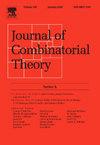巴兰坦和梅尔卡关于 6 不规则分区截断和的猜想的证明
IF 0.9
2区 数学
Q2 MATHEMATICS
引用次数: 0
摘要
2012 年,安德鲁斯和梅尔卡证明了欧拉五边形数定理的截断定理。他们的工作开启了截断数列的新研究。最近,Ballantine 和 Merca 提出了一个关于涉及 b6(n) 的无限不等式族的猜想,该猜想计算了 n 的 6 规则分区数。在本文中,我们根据 Cayley 提出的将 n 分成不超过 3 部分的公式,证实了 Ballantine 和 Merca 关于 b6(n) 线性等式的猜想。本文章由计算机程序翻译,如有差异,请以英文原文为准。
Proof of a conjecture of Ballantine and Merca on truncated sums of 6-regular partitions
In 2012, Andrews and Merca proved a truncated theorem on Euler's pentagonal number theorem. Their work has opened up a new study of truncated series. Recently, Ballantine and Merca posed a conjecture on infinite families of inequalities involving , which counts the number of 6-regular partitions of n. In this paper, we confirm Ballantine and Merca's conjecture on linear equalities of based on a formula of the number of partitions of n into parts not exceeding 3 due to Cayley.
求助全文
通过发布文献求助,成功后即可免费获取论文全文。
去求助
来源期刊
CiteScore
2.90
自引率
9.10%
发文量
94
审稿时长
12 months
期刊介绍:
The Journal of Combinatorial Theory publishes original mathematical research concerned with theoretical and physical aspects of the study of finite and discrete structures in all branches of science. Series A is concerned primarily with structures, designs, and applications of combinatorics and is a valuable tool for mathematicians and computer scientists.

 求助内容:
求助内容: 应助结果提醒方式:
应助结果提醒方式:


